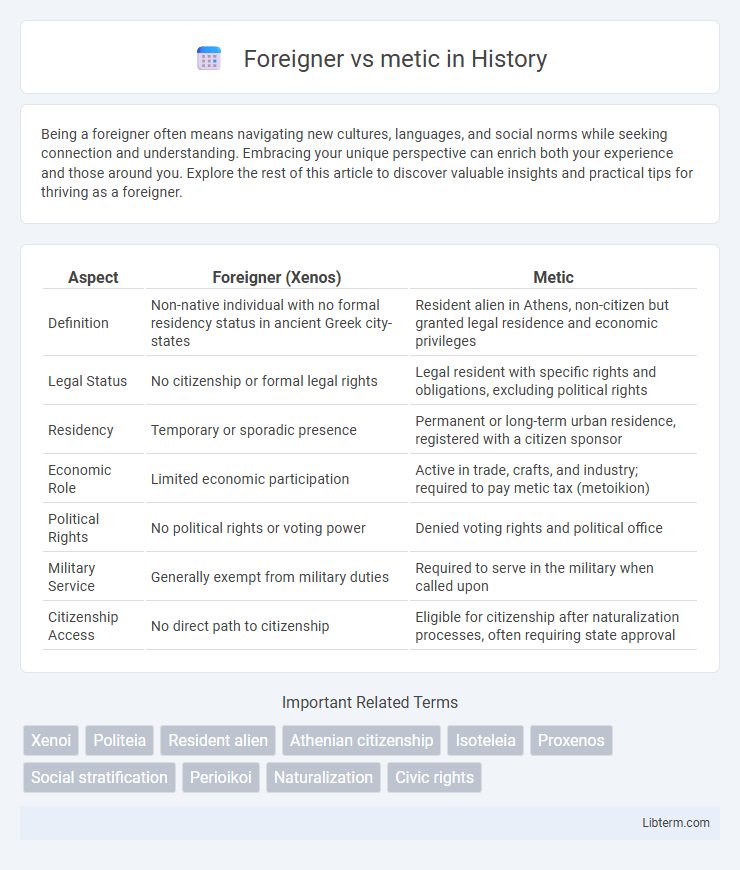Being a foreigner often means navigating new cultures, languages, and social norms while seeking connection and understanding. Embracing your unique perspective can enrich both your experience and those around you. Explore the rest of this article to discover valuable insights and practical tips for thriving as a foreigner.
Table of Comparison
| Aspect | Foreigner (Xenos) | Metic |
|---|---|---|
| Definition | Non-native individual with no formal residency status in ancient Greek city-states | Resident alien in Athens, non-citizen but granted legal residence and economic privileges |
| Legal Status | No citizenship or formal legal rights | Legal resident with specific rights and obligations, excluding political rights |
| Residency | Temporary or sporadic presence | Permanent or long-term urban residence, registered with a citizen sponsor |
| Economic Role | Limited economic participation | Active in trade, crafts, and industry; required to pay metic tax (metoikion) |
| Political Rights | No political rights or voting power | Denied voting rights and political office |
| Military Service | Generally exempt from military duties | Required to serve in the military when called upon |
| Citizenship Access | No direct path to citizenship | Eligible for citizenship after naturalization processes, often requiring state approval |
Definition of Foreigner and Metic
A foreigner is an individual who originates from a different country and resides temporarily or permanently outside their nation of birth, often lacking legal citizenship status in the host country. A metic, historically in ancient Athens, referred to a non-citizen resident who was granted certain legal protections and responsibilities but was excluded from political rights and ownership of land. While foreigners generally denote any non-native inhabitant, metics specifically describe a class of resident aliens with defined social and economic roles within classical Greek city-states.
Historical Contexts: Foreigner vs Metic
In ancient Greece, a "foreigner" referred broadly to any non-citizen, while a "metic" specifically denoted a resident alien in city-states like Athens who lived and worked but lacked political rights. Metics were essential to the economy, often engaging in trade, craftsmanship, and various services but were subject to special taxes and legal restrictions unlike full citizens. The distinction highlights complex social hierarchies and citizenship laws that shaped participation in civic life during classical antiquity.
Legal Status and Rights
Foreigners typically refer to non-citizens residing temporarily or permanently in a country, often with limited legal rights compared to citizens, including restrictions on voting, employment, and property ownership. Metics, especially in ancient contexts like Athens, were resident aliens who possessed certain legal protections, could engage in commerce, and were subject to taxation but lacked political rights such as citizenship and voting. The distinction between foreigners and metics hinges on legal status, where metics had a recognized but limited legal presence codified by the state, unlike transient foreigners with more restricted or no formal legal standing.
Social Integration and Community Roles
Foreigners often face challenges in social integration compared to metics, who historically held recognized community roles and contributed economically and culturally within their host societies. Metics, particularly in ancient Greek city-states, were granted certain rights and responsibilities, facilitating smoother inclusion and participation in civic life. The distinction in social status directly influenced foreigners' access to community support networks and their ability to fully engage in local societal functions.
Economic Contributions and Limitations
Foreigners contribute to the economy through diverse skills, higher consumption rates, and investment in local businesses, boosting innovation and market dynamism. Metics, often restricted by legal and social limitations, face barriers in property ownership and long-term economic integration, which can limit their full economic participation. Despite these constraints, both groups play crucial roles in urban economic development, with foreigners frequently enhancing trade links and metics supporting artisan and retail sectors.
Cultural Perceptions and Stereotypes
Foreigners are often perceived through cultural stereotypes that emphasize differences in language, customs, and behaviors, leading to generalized assumptions about their abilities or intentions. Metics, as resident foreigners in ancient Athens, experienced a more nuanced cultural perception, being integrated economically yet socially marginalized due to their outsider status. These distinctions reveal how cultural identity and legal classification influenced societal attitudes and treatment of non-citizens in historical contexts.
Comparing Ancient and Modern Perspectives
Foreigners in ancient societies were often viewed as outsiders lacking full civic rights, whereas metics in ancient Athens had legal residency but limited political privileges, highlighting a nuanced social hierarchy. Modern perspectives tend to emphasize inclusivity and human rights, contrasting with the rigid distinctions of ancient times. Immigration policies today reflect efforts to balance national identity with multicultural integration, unlike the more exclusionary practices toward foreigners and metics in classical antiquity.
Case Studies: Foreigner and Metic in Different Societies
Case studies of foreigners and metics in ancient societies reveal significant distinctions in legal status and social integration. In classical Athens, metics were non-citizen residents subject to taxes and military obligations but excluded from political rights, contrasting with foreigners who were temporary visitors without official registration. In other societies like Rome, foreigners sometimes gained citizenship through legal processes, while metics in Athens consistently occupied an intermediate social class essential for commerce and cultural exchange.
Challenges Faced by Foreigners and Metics
Foreigners and metics in ancient Greece both encountered legal and social challenges, including limited political rights and restrictions on property ownership. Foreigners often faced difficulties integrating due to language barriers and lack of citizenship privileges, while metics, as resident aliens, were subject to special taxes and had to register with authorities. Both groups navigated social exclusion and legal constraints that impacted their economic and civic participation.
Future Trends and Evolving Identities
Future trends suggest a growing blurring between the concepts of foreigner and metic as global migration patterns intensify and digital connectivity reshapes identity formation. Emerging legal frameworks increasingly recognize hybrid identities, granting metics enhanced rights that challenge traditional distinctions based on nationality or residency. Societal shifts emphasize multicultural integration and transnational belonging, indicating evolving identities that transcend static categories of foreignness.
Foreigner Infographic

 libterm.com
libterm.com